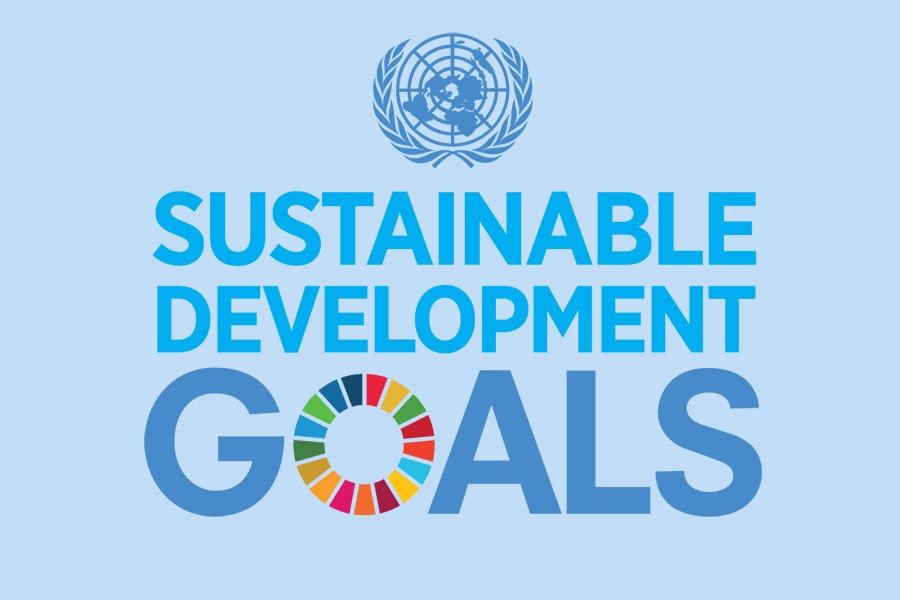Bangladesh is trying its best to achieve the goals of the Sustainable development goals (SDGs) set by the United Nations (UN). The country's government is politically committed to meet such goals.
The Sustainable Development Goals (SDGs) sponsored by the United Nations (UN), otherwise known as the Global Goals or Agenda 2030, are a universal call of action to end poverty, protect the planet and ensure that all people, irrespective of their country of origin, enjoy peace and prosperity.
The SDGs, built on the successes of the Millennium Development Goals (MDGs), include new areas such as climate change, economic inequality, innovation, sustainable consumption, peace and justice, among other priorities. The goals are otherwise interconnected - often the key to success on one will involve tackling issues associated with another.
The SDGs, in fact, provide clear guidelines and targets for all countries of the world to adopt in accordance with their own priorities and the environmental challenges.
On the other hand, poverty eradication is at the heart of the 2030 Agenda, and so is the commitment to leave no one behind. The Agenda offers a unique opportunity to put the whole world on a more prosperous and sustainable development path.
The SDGs came into effect in January 2016, and will continue to guide the UN's policy and funding for the next 15 years. As the lead UN development agency, UNDP is uniquely placed to help implement the goals through its work in some 170 countries and territories. Its strategic plan focuses on key areas including poverty alleviation, democratic governance and peace building, climate change and disaster risk, and economic inequality. The UN agency provides support to governments to integrate the SDGs into their national development plans and policies.
Unfortunately, Bangladesh did not fare well in the SDG Index and Dashboards Report 2017 prepared by the UN Sustainable Development Solutions Network. It scored a rank of 120 out of 157 countries in the world. Its overall performance on the index was 56.2, lower than the regional average score of 63.3. Bhutan, India, Nepal and Sri Lanka all scored higher than Bangladesh on the index.
Bangladesh received red ratings on the SDG2-zero hunger, SDG3-good health and well-being, SDG4-quality education, SDG7-affordable and clean energy, SDG8-decent work and economic growth, SDG9-industry, innovation and infrastructure, SDG11-sustainable cities and communities, SDG14-life below water, SDG16-peace, justice and strong institutions and SDG 17-partnership for the goals.
A recent study on various aspects of Bangladesh's achieving the SDGs shows how to identify the key development interventions and develop a well-defined roadmap for long-term planning. The report on SDGs financing strategy provides an estimate of the annual resource gap and an opportunity to revise the government interventions and financing strategies accordingly.
One of the various challenges the country is facing is that it is lagging far behind in project implementation. It must improve the capacity to properly implement the projects and programmes taken in hand. It should be kept in mind that the efficiency gained in public sector spending is a must to that end. Delays in project implementation have detrimental impact on cost as well as on the intended benefits.
The SDGs, to mention, include 17 goals and 169 targets that set out quantitative and qualitative objectives. The newly incorporated goals in the SDGs are more comprehensive and expansive in nature. And thus it will explore development schemes of vital importance to humanity at large.
Bangladesh has already become a low middle income country and is on way to become a middle income country. In this context, the country has prepared an actionable agenda by formulating Perspective Plan (2010-2021) and two Five Year Plans (FYPs). Bangladesh integrated the 2030 Agenda in its 7th FYP (2016-2020).
There are ample opportunities to implement the 2030 Agenda by giving the priorities of the SDGs in the national plan. The government has reportedly adopted "Whole of Society" approach to ensure wider participation of NGOs, development partners, private sector, civil society organisations (CSOs) and media in the process of formulation of the Action Plan and implementation of the SDGs.
In order to spearhead the process, SDGs Implementation and Monitoring Committee has been formed at the Prime Minister's Office to facilitate and implementation of SDGs Action Plan.
The government is reported to have finalised an action plan for implementation of the SDGs in alignment with the 7th Five Year Plan (FYP). Respective ministries are working to translate the particular targets into actionable activities in this regard.
There are enormous challenges in collection, analysis, desegregations, and dissemination of data. The country needs to build collaboration at bilateral, regional and global levels for capacity building and sharing of best practices.
SDGs demand concerted and collective efforts with strong political commitment at all levels. The 2030 Agenda comes at a time when Bangladesh has already kicked off its journey towards an upper middle income country by 2030 and a developed country by 2041.
The country has incorporated priorities of SDGs in all its development policies. The government has adopted an inclusive approach to development so that the poorest and the most vulnerable section of the country can be integrated into its national development efforts.
The sustainable development goals reflect our contemporary understanding that social, economic, and environmental issues cannot be clearly divided. The issues are intertwined at the global level as well as household level. Therefore, implementation of SDGs, as argued by some, is not the responsibility of the government alone, but necessitates the participation of all relevant stakeholders.
The country is in the third year of SDG implementation. It needs to move fast not only to just compete with others but also to lead in the area of innovative development solutions.


